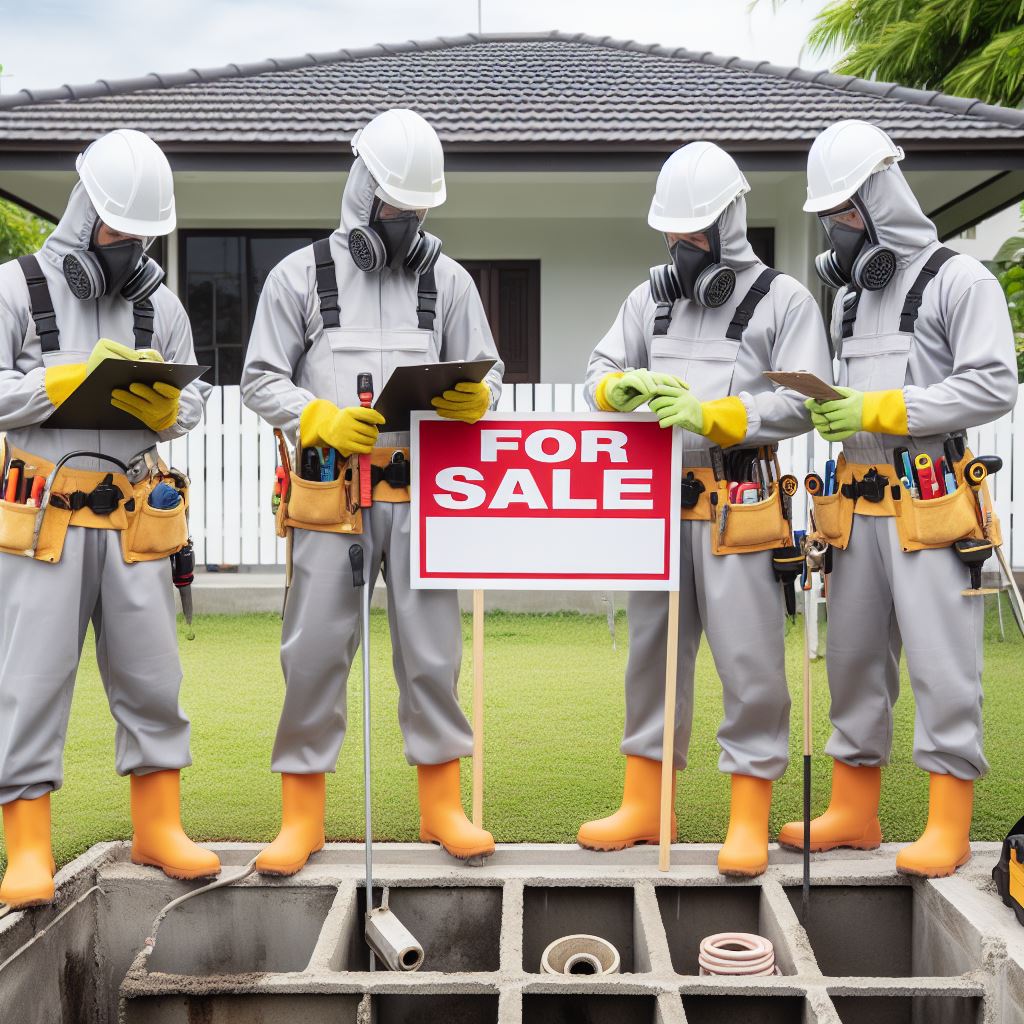The Importance of Home Inspections in the Real Estate Market
Home inspections play a crucial role in the real estate market. When buying or selling a property, it is essential to have a thorough understanding of its condition and potential issues. A home inspection provides a comprehensive evaluation of a property’s structural integrity, safety, and overall condition. This evaluation is conducted by a professional home inspector who examines various aspects of the property, including its foundation, electrical systems, plumbing, and HVAC systems.

One of the primary reasons why home inspections are vital in the real estate market is that they help buyers make informed decisions. Purchasing a home is a significant investment, and buyers need to be aware of any potential problems or defects before finalizing the transaction. A home inspection report provides buyers with a detailed analysis of the property’s condition, allowing them to negotiate repairs or adjust the purchase price accordingly.
Furthermore, home inspections protect buyers from unexpected expenses. By identifying any hidden issues, such as water damage or faulty wiring, a home inspection can save buyers from costly repairs down the line. Sellers are legally obligated to disclose any known defects, but not all issues may be apparent to the untrained eye. A professional home inspector can uncover these hidden problems, giving buyers the opportunity to address them before closing the deal.
Home inspections also benefit sellers in the real estate market. By conducting a pre-listing inspection, sellers can identify and address any issues before putting their property on the market. This proactive approach allows sellers to make necessary repairs or improvements, increasing the chances of a smooth and successful sale. Additionally, a pre-listing inspection can help sellers set a realistic asking price based on the property’s condition.
In some cases, sellers may choose to provide potential buyers with a copy of the home inspection report. This transparency can build trust and confidence among buyers, as they have a clear understanding of the property’s condition. It also reduces the likelihood of negotiations falling through due to unexpected issues discovered during the buyer’s inspection.
Home inspections are not only beneficial for buyers and sellers but also for real estate agents. By recommending a home inspection to their clients, agents demonstrate their commitment to ensuring a fair and transparent transaction. This can help build a positive reputation and foster long-term relationships with clients.
In conclusion, home inspections are of utmost importance in the real estate market. They provide buyers with valuable information about a property’s condition, allowing them to make informed decisions and avoid unexpected expenses. Sellers can also benefit from home inspections by addressing any issues before listing their property, increasing its marketability. Real estate agents who prioritize home inspections demonstrate their dedication to their clients’ best interests. Overall, home inspections contribute to a more transparent and efficient real estate market, benefiting all parties involved.
Trends and Innovations in the Home Inspection Industry
The home inspection market has seen significant growth and innovation in recent years. As more and more people are investing in real estate, the demand for home inspections has increased. This has led to the emergence of new trends and innovations in the home inspection industry.
One of the key trends in the home inspection market is the use of advanced technology. Traditionally, home inspectors relied on manual tools and visual inspections to assess the condition of a property. However, with the advent of new technologies, such as thermal imaging cameras and drones, home inspectors are now able to provide more accurate and detailed reports.

Thermal imaging cameras, for example, can detect hidden issues such as water leaks and electrical problems by capturing the heat signatures of different objects. This technology allows home inspectors to identify potential problems that may not be visible to the naked eye. Similarly, drones have revolutionized the way home inspections are conducted. They can capture high-resolution images and videos of the property, providing a comprehensive view of its condition. This not only saves time but also allows for a more thorough inspection.
Another trend in the home inspection market is the focus on energy efficiency. With the increasing concern for the environment and rising energy costs, homeowners are now more interested in properties that are energy-efficient. As a result, home inspectors are now paying more attention to the energy efficiency of a property during their inspections.
This includes assessing the insulation, HVAC systems, and the overall energy consumption of the property. Home inspectors are also providing recommendations on how homeowners can improve the energy efficiency of their homes, such as installing energy-efficient appliances or improving insulation.
In addition to technology and energy efficiency, another trend in the home inspection market is the emphasis on indoor air quality. Poor indoor air quality can have a significant impact on the health and well-being of homeowners. As a result, home inspectors are now testing for pollutants such as mold, radon, and volatile organic compounds (VOCs) during their inspections.
They are also providing recommendations on how homeowners can improve the indoor air quality of their homes, such as proper ventilation and the use of air purifiers. This trend reflects the growing awareness of the importance of a healthy living environment.
Furthermore, the home inspection market has also seen innovations in terms of the services offered. In addition to the traditional pre-purchase inspections, home inspectors are now offering specialized inspections for specific areas of the property, such as pool inspections or pest inspections.
This allows homeowners to get a more comprehensive assessment of their property and address any specific concerns they may have. Home inspectors are also offering additional services such as radon testing or mold inspections, providing homeowners with a one-stop solution for all their inspection needs.
In conclusion, the home inspection market is experiencing significant trends and innovations. The use of advanced technology, the focus on energy efficiency and indoor air quality, and the expansion of services offered are all shaping the industry. These trends not only provide homeowners with more accurate and detailed inspections but also contribute to the overall improvement of the quality of homes. As the real estate market continues to grow, it is expected that the home inspection industry will continue to evolve and adapt to meet the changing needs of homeowners.
How to Choose a Reliable Home Inspector for Your Property
The process of buying a home can be both exciting and overwhelming. It is a significant investment, and you want to ensure that you are making the right decision. One crucial step in the home buying process is getting a home inspection. A home inspection is a thorough examination of a property’s condition, including its structural integrity, electrical systems, plumbing, and more. It provides buyers with valuable information about the property’s condition and any potential issues that may need to be addressed.

When it comes to choosing a reliable home inspector for your property, there are several factors to consider. First and foremost, you want to ensure that the home inspector is qualified and experienced. Look for a home inspector who is licensed and certified by a reputable organization, such as the American Society of Home Inspectors (ASHI) or the International Association of Certified Home Inspectors (InterNACHI). These organizations have strict standards and codes of ethics that their members must adhere to, ensuring that you are working with a professional who is knowledgeable and competent.
In addition to qualifications, it is essential to consider the inspector’s experience. Look for someone who has been in the industry for several years and has conducted numerous inspections. An experienced home inspector will have a keen eye for detail and will be able to identify potential issues that a less experienced inspector might miss. They will also have a better understanding of local building codes and regulations, which is crucial when assessing a property’s compliance.
Another important factor to consider when choosing a home inspector is their reputation. Look for reviews and testimonials from previous clients to get an idea of their level of professionalism and the quality of their work. You can also ask for references and contact them directly to inquire about their experience with the inspector. A reliable home inspector will have a track record of satisfied clients and will be more than willing to provide references to support their claims.
Communication is key when it comes to working with a home inspector. You want someone who is responsive and willing to answer any questions or concerns you may have. A reliable home inspector will take the time to explain their findings in a clear and understandable manner, ensuring that you have a comprehensive understanding of the property’s condition. They will also provide a detailed written report, complete with photographs and recommendations for any necessary repairs or improvements.
Lastly, consider the cost of the home inspection. While it is essential to find a home inspector who offers competitive pricing, it is equally important not to base your decision solely on cost. Remember that a home inspection is an investment in your future, and choosing a qualified and experienced inspector will provide you with peace of mind and potentially save you from costly repairs down the line.
In conclusion, choosing a reliable home inspector for your property is a crucial step in the home buying process. By considering factors such as qualifications, experience, reputation, communication, and cost, you can ensure that you are working with a professional who will provide you with a thorough and accurate assessment of the property’s condition. A reliable home inspector will give you the confidence to make an informed decision and move forward with your home purchase.
Common Issues Found During Home Inspections and How to Address Them
The home inspection market has seen significant growth in recent years, as more and more people recognize the importance of having a thorough inspection before purchasing a property. A home inspection is a critical step in the home buying process, as it helps identify any potential issues or problems with the property. In this article, we will discuss some common issues found during home inspections and provide guidance on how to address them.

One of the most common issues found during home inspections is electrical problems. Faulty wiring, outdated electrical panels, and inadequate grounding are just a few examples of electrical issues that can be uncovered during an inspection. These issues can pose serious safety hazards and should be addressed promptly. Hiring a licensed electrician to assess and repair any electrical problems is highly recommended.
Another common issue found during home inspections is plumbing problems. Leaky pipes, clogged drains, and faulty water heaters are among the most frequently encountered plumbing issues. These problems can lead to water damage, mold growth, and even structural damage if left unaddressed. It is essential to have a qualified plumber inspect the plumbing system and make any necessary repairs or replacements.
Structural issues are also commonly identified during home inspections. Cracks in the foundation, sagging floors, and roof problems are all signs of potential structural issues. These issues can be costly to repair and may require the expertise of a structural engineer. It is crucial to address any structural problems promptly to prevent further damage and ensure the safety and stability of the property.
Mold and moisture problems are another common issue found during home inspections. Mold growth can be caused by water leaks, poor ventilation, or high humidity levels. Mold can cause health issues and damage to the property if not properly addressed. Hiring a professional mold remediation company to assess and remove any mold is essential to ensure a safe and healthy living environment.
Inadequate insulation and poor energy efficiency are also frequently identified during home inspections. Insufficient insulation can lead to energy loss, higher utility bills, and discomfort for the occupants. Upgrading insulation and improving energy efficiency can help reduce energy consumption and create a more comfortable living space. Consulting with an energy auditor or insulation contractor can provide valuable insights and recommendations for improving energy efficiency.
Lastly, pest infestations are a common issue found during home inspections. Termites, rodents, and other pests can cause significant damage to a property if not addressed promptly. Hiring a professional pest control company to assess and treat any infestations is crucial to prevent further damage and ensure a pest-free living environment.
In conclusion, home inspections play a vital role in the home buying process by identifying potential issues and problems with a property. Electrical problems, plumbing issues, structural concerns, mold and moisture problems, inadequate insulation, and pest infestations are among the most common issues found during home inspections. Addressing these issues promptly and hiring qualified professionals to make any necessary repairs or treatments is essential to ensure the safety, comfort, and value of the property. By addressing these common issues, homebuyers can make informed decisions and have peace of mind knowing that their new home is in good condition.